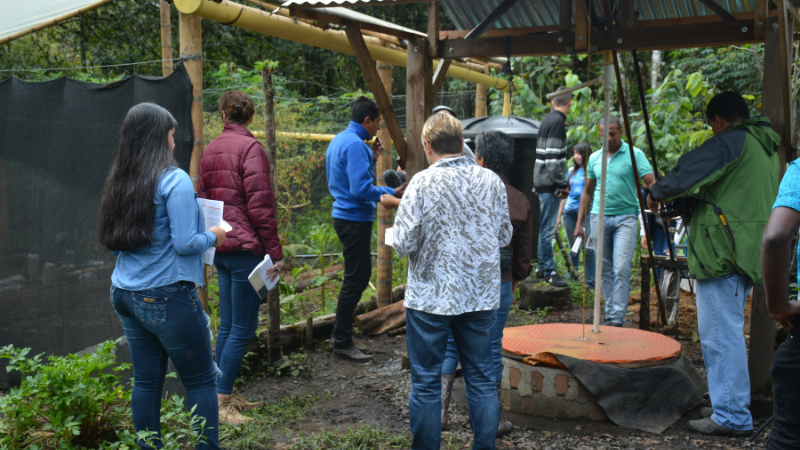by CGIAR-CCAFS*, Ecohabitats Foundation and Asociación de Juntas de Acción Comunal del noroccidente de Popayán – Cauca-Colombia (Association of Community Action Boards of the northwest of Popayán – Cauca-Colombia)
Description
The main impacts of climate change are: drought, strong winds, hails, excessive rainfall and uncertainty on when and what to plant.
The main effects are:
- Economic losses due to production or quality reduction;
- Food insecurity due to non-production periods due to climate variability, thus they have to buy their food in the city (Popayan);
- Soil deterioration, due to lack of knowledge on soil nutrition needs and management during drought or flooding periods;
- Lack of access and availability of water for irrigation, especially during seasons with low precipitation.
Great practices have been implemented with Ecohabitats – CCAFS-CIAT support. These are:
- Home garden with plastic cover, rainwater harvesting, water storage tank and drip irrigation;
- Biofactories: sites to produce solid and liquid organic fertilizers with mountain micro-organisms, and zinc roof used for rainwater harvesting;
- Reservoirs on and under land (with a plastic cover that allow storage of 30,000 to 40,000 litres of water, covered with shade meshes to prevent the decomposition of the leaves in the water and the deterioration of its quality;
- Mechanical water pump to extract the groundwater, adapted with a bicycle to facilitate the extraction;
- Different kind of home gardens (circular, vertical, traditional) adapted to the needs of the family;
- Crop diversification, including the pilot experience of vegetable production in greenhouses of 400 m2;
- Introduction of varieties of bean tolerant to drought and biofortified beans and corn. All of the above, under a community approach led by the local partner Ecohabitats and the support of CCAFS and CIAT, through the field schools for adaptation approach, land planning for adaptation, participatory research, and social innovation, among others.
Results
- Families adapted to climate variability with knowledge in the design and implementation of adaptation measures and farm planning incorporating climate factors;
- 3 young leaders, 18 adults trained to implement adaptation measures and with the experience and capacity of replicate measures in other municipalities of the country;
- A start-up led by a young woman, as an evidence that the farm is a capital for the new generations;
- A vegetable marketing chain linked to over 60 organizations led by women farmers in coordination with governmental and non-governmental organizations;
- 7 communities strengthened with ties of solidarity and valuing knowledge as part of its adaptation mechanisms;
- Pilot experience for Latin America, consolidated in a territory with high vulnerability to climate change that serves as an apprenticeship to other territories and countries.
*Being CCAFS the presenter of this initiative no “Climate Smartness” assessment was included in this practice.


